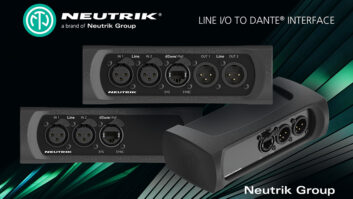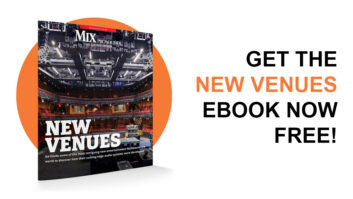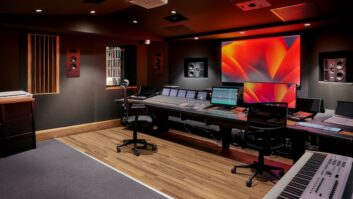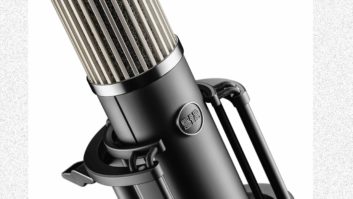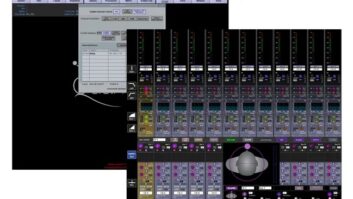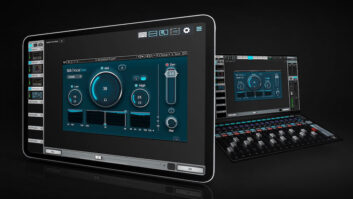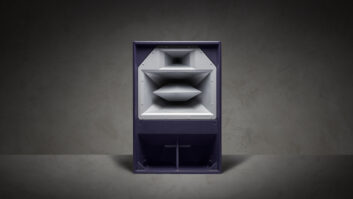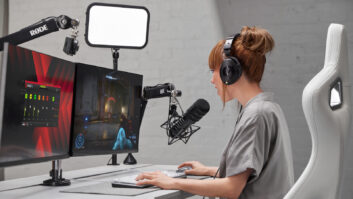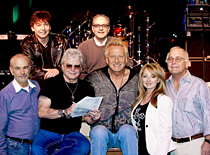
Pictured from left, top row: Bob Ferrari, head of audio production, and label president Ted Joseph; bottom row, from left: Air Supply manager Barry Siegel, lead vocalist Russell Hitchcock, guitarist and vocalist Graham Russell, and Odds On Records & Studios owners Becki Vincent and Wally Simmons.
Odds On Records & Studios, a $7 million state-of-the-art recording facility in Las Vegas, has launched a record label that rounds off its turnkey customer service.
“By having the studio and label under one roof, we are able to save time and money for the artist, since the studio and label will work in tandem of one another,” says Odds On Records & Studios label president Ted Joseph. “In addition, our boutique operation allows us to respond much more quickly to the changes in the evolving marketplace of digital downloads, and produce more effectively than many of the major record labels out there today.”
Joseph says that Odds On Records & Studios’ label strives to sign on a small group of artists at a given time to offer personalized customer service. “Often with larger record companies, artists do not get the one-on-one attention they deserve,” explains Joseph. “Instead, many are moved around like chess pieces on a board. With Odds On Records & Studios, artists are not treated as a number, but instead are all regarded as equal priority. Our label makes sure it responds quickly to its artists’ needs and works closely with the studio throughout the recording and mixing process.”
Joseph says that as an independent label, Odds On Records & Studios can use conventional marketing methods as well as take a grassroots approach in seeking a higher profile for its artists. “Over the past 30 years, major labels would market songs by going to radio stations with the hopes that they would program their music. They’d also be dependent on having retailers sell the physical album,” Joseph says. “What Odds On Records & Studios label does is capitalize on today’s digital era in an effort to get our artists exposure without solely relying on radio and traditional retail. We are able to personally assist our clients in other avenues such as concerts, digital download sites, radio and Internet, maximizing all possible opportunities.”
Artists who have signed on with Odds On Records & Studios’ label include the iconic group Air Supply, the up-and-coming band Ultraviolet Sound, and new artists Adam Lopez and Greg Medoro.
To learn more about this new studio-label venture, Mix spoke with label president Ted Joseph and head of audio production Bob Ferrari.
What prompted you in the first place to decide to add a label to your studio business?
Joseph: We thought it would be a great complement to have both under one roof, so to speak—sort of like a one-stop shop where we’re going to have independent clients coming in and recording in the studio, and then the artists that we sign. On the label side, we would have the opportunity to have them also benefit from having a really tremendous studio to do their recording in also. For example, one of the groups we signed recently is Air Supply. Air Supply is a band that has, over the years, have sold upwards of 20 million units in their long, illustrious career, and they’re planning on coming into the studios also to lay some tracks. So that’s really one of the first examples of what we’re looking at, where it really is a great service for our artists to also be able to use the wonderful studios that we have.
Ferrari: I think there’s also a bit of the old school model here, where because we have the label and the studios, we can take what would for any other company be down time in the studio and use it for artist development, and put a little more into that artist development that’s kind of gotten away from some of the bigger labels.
Joseph: That’s kind of the forgotten art that was so necessary in the ’70s and the ’80s, of course. Most of the major labels have abandoned the artist development component of a record company.
Ferrari: I think that [with] people like [Odds On Records & Studios staff engineers] James “Bonzai” Caruso and Sean O’Dwyer, and Ted and myself, you’ve got a whole group of people with a very musical background. Ted handles that creative marketing, but he’s tied in closely with the music; it’s not like a record gets finished and a marketing department off in some other building gets it and says, “Oh. What do we do with this?” We’re hand in hand with that stuff the minute a band is brought on board.
In the Mix May 2009 feature “Getting The Music Noticed,” a
Q&A with four multitasking producers, the first question posed to
the producers interviewed for the story begins with the statement,
“Anybody can make a record now, but the business of getting music out
there and making sure listeners take notice and maybe pay for it is
changed.” It seems that Odds On Records & Studios is addressing
that issue with the new in-house label operation.
Joseph:
Absolutely. And the point you made about the music consumer now: It’s
so elusive today, and they’re so selective and specific in their
tastes. Twenty years ago we had the music consumer basically
captivated; now there are all the other modes of new media, whether it
be computers, videogames, etc. Many people feel that music should be
free, and they actually take it without paying for it. Once these
people understand how that impacts the record label, the songwriter,
the publisher, the producer, and everybody down that food chain, [they]
then begin to realize that paying 99 cents for a download is the right
thing to do. And of course it’s incumbent upon us as a label to make
music that people find provocative and of course ultimately will want
to buy, because there’s such a glut of music out there in the
marketplace. I think a lot of that has to do with American Idol.
Now everybody thinks they can sing, and if they have a computer, they
can make music. But the bottom line still persists that the good
music—the music that’s able to touch the consumer—is that type of music
that people are willing to buy and purchase.
Ferrari: I think that having so much product out there that
hasn’t been given the proper development treatment just lends to a lot
of mediocre product. I think you’re going to [see] much more longevity
if [record labels] were able to trim their rosters down to something
that was manageable, that could be developed properly, and spend two or
three records bringing an act up to snuff, [rather] than put out 20
artists that don’t do anything.
Joseph: We’re just not looking for hit records, so to speak;
we’re looking for artists that we can develop. Of course a band like
Air Supply has been there for decades. They have a very solid brand,
but then again we have another band called Ultraviolet Sound, which is
a new band that we have a lot of faith in.
As this label becomes established, I imagine you’re going to hear
from people who approach the label before they approach the studio.
Ferrari:
We’re starting to get that already. We do encourage people to send
stuff because we are always looking. Something great is something
great; there’s no disputing that. But [for] everybody who sends
something, [it] doesn’t mean that they’re going to get a record deal;
that’s just the way the world works! [Laughs]
It’s interesting that a label can be a solution to what’s going on
in today’s marketplace, which has caused some artists to avoid working
with labels. They figure, “Well, I’ll just get my music out there on my
own.”
Joseph: People will say, “My song is up on
iTunes.” Well, what does that mean? Many new bands think if you put [a
song] up on iTunes, [fans will] show up. And of course it still takes
marketing, etc., just to get traffic to listen to your music and decide
whether they want to purchase it or not. MySpace, Facebook and
Twitter—those are all great new media areas, but none are a magic wand,
which many people think they are. There are millions upon millions of
MySpace sites up, and how do you get traffic to your particular artist
or your band?
Ferrari: There’s a lot of exposure [available] but no dollars
changing hands, and as much as music fans may want it to be free, how
much can any of these artists support themselves if they’re not making
revenue from all this hard work?
For more information about Odds On Records & Studios in Las Vegas, watch Bob Ferrari’s video tour of the facility, which features the largest SSL Duality console in North America. Plus, read “Odds On Records & Studios Opens Its Doors” and “Las Vegas’ Odds On Recording Expands With New Rooms, Gear,” and visit www.oddsonrecording.com.
